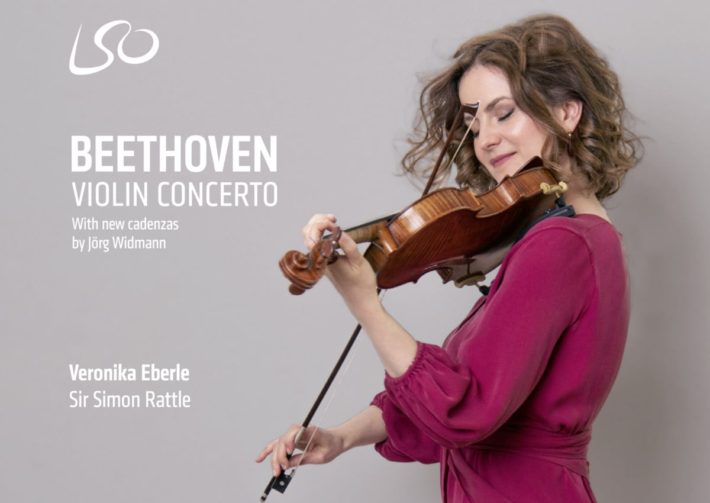Violinist Veronika Eberle began violin lessons at the age of six, and four years later began studies at the Richard-Strauss-Konservatorium in Munich with Olga Voitova. Her 2006 Salzburg Easter performance of the Beethoven concerto, accompanied by the Berliner Philharmoniker and Simon Rattle, brought her to international attention, so it seems fitting that her debut concerto album features that same concerto, accompanied by Rattle and the LSO.
Reviewing Midori’s recording of this work (November 2020), I wrote that Beethoven’s Violin Concerto is unusual for eschewing the bravado and conflict of his piano concertos for the gentler, cooperative serenity heard in this music. And this new recording certainly confirms that difference. The opening movement’ introduction is exquisitely shaped, woodwinds balanced well to the fore, strings adopting a historically informed lightness and minimal vibrato. Eberle’s initial entrance has a compelling improvisatory freedom, and throughout the movement she produces a focused, silvery tone with spotless intonation. Yet about seven minutes in, my attention began to wander, because the serene atmosphere never wavers and begins to seem bland or under-characterized. Turn to Jansen and Jarvi (Decca) or Kopatchinskaja and Herreweghe (Naïve) and one hears a greater variety of attack, weight, and color. Here there is a hyper-focus on beauty for its own sake, resulting in a generalized color and unsatisfying emotional objectivity.
There is no doubting the technical accomplishment or (at times) breathtaking beauty of Eberle’s playing. And the subtle sophistication of the orchestral accompaniment is also impressive – surely the composer never got to hear his music played this well. But the tempos, at least for the first two movements, feel too slow, at times almost static. In fact, this is the slowest performance I know: Eberle’s first movement lasts 26’05” versus Kopatchinskaja’s 22’41”, Jansen’s 22’56” and Midori’s 23’39”.
Related Posts
- Review: Beethoven – Violin Concerto, Romances – Midori
- Review: Beethoven And Sibelius Violin Concertos – Christian Tetzlaff
- Review: Beethoven – Violin Concerto, Septet – Kavakos
Part of this difference in timings is the rather lengthy cadenzas Eberle uses, written by contemporary composer Jörg Widmann. If we subscribe to the original idea of a cadenza, in which the soloist improvises a passage demonstrating virtuosity and creativity, then we should accept that the compositional style of the cadenza may differ from the composer’s. That is certainly the case here, where the angular writing, higher levels of dissonance, and use of additional instruments (timpani, contrabass and flute), clearly indicate a contemporary compositional voice. Widmann’s writing is undeniably novel, at times fascinating, and impressive (for instance, the second movement’s cadenza with Eberle playing in the instrument’s highest register, track 2, 10’50”). Nevertheless, the juxtaposition of these two substantially different voices may prove problematic for some listeners.
The second movement is again beautifully played and shaped. The LSO players really listen, creating a chamber music intimacy between themselves and Eberle. I also sensed greater ardor in the playing, the first movement’s eloquent objectivity, here replaced by a true emotional connection that is vulnerable and more touching.
The final movement too, is more successful, the energy level significantly higher, the characterization cheekier, perhaps a result of finally allowing the pent up energy and passion, so tightly held in check in the first two movements, to freely flow. However, especially after repeated listening, the use of clapping in this movement’s cadenza became exasperating.
The album concludes with a true rarity, a fragment of an unfinished violin concerto, most likely dating from 1790-1792, Beethoven’s final two years in Bonn. The surviving Allegro con brio consists of two orchestral tutti sections framing the solo violin’s first statement, and the beginning of its second. While several attempts have been made to complete the movement, Eberle here records only the original fragment. It is pleasant music that never rises to the exalted level of his other concertos. It is disconcerting, however, to hear the music suddenly end, mid-thought, without any satisfying resolution – perhaps it should have been programmed first?
The March 2022 recording, made in the LSO’s Jerwood Hall, is clear and warm, without the issues that plague the orchestra’s recording made in Barbican Hall. Balance between soloist and (a slightly reduced) orchestra is excellent. Liner notes, as always from this source, are brief but informative, and include an addendum by Widmann discussing his cadenzas. Eberle is a deeply impressive player, the playing is consistently beautiful, and the early concerto fragment is a real rarity, worth getting to know. Not a first choice perhaps, but a fascinating alternative.

Beethoven – Violin Concerto Op. 61, Fragment Wo0 5
Veronika Eberle – Violin
London Symphony Orchestra
LSO 5094
Recommended Comparisons
Read more classical music reviews or visit The Classic Review Amazon store











